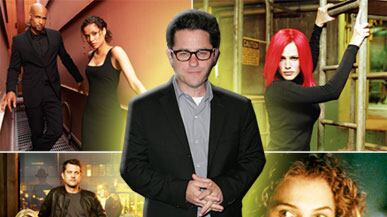J.J. Abrams has lost his Midas touch when it comes to television.
Abrams made his name in TV. He birthed some of the most serpentine, brain-twisting programming of the last decade, deeply serialized dramas with overarching mythologies that stood out among the onslaught of procedurals. Abrams' television body of work—summed up best by Lost (and drama Felicity)—offered the audience intelligent adventures, deft characterizations, and weighty backstories. His shows were the opposite of procedurals: They were appointment television that demanded a strict attention to details, an elephantine memory, and an adherence to follow the ins and outs of each episode.
Abrams is now largely focusing on blockbusters like the Star Trek franchise reboot, Cloverfield (which he executive produced), and Mission Impossible III. (Though Abrams executive produced comedy Morning Glory, opening this week, his next film as a writer-director, Super 8, is a secrecy-shrouded film from executive producer Steven Spielberg.)
Which is why it's surprising that Abrams' latest small-screen endeavor, espionage dramedy Undercovers, which he co-created with Josh Reims ( Felicity), crashed and burned so quickly. After mediocre reviews and plummeting ratings (premiering to just 8.6 million viewers, it shed nearly 3 million over the course of the next six installments), NBC announced last week that it would not be picking up a full season of the show and was putting three episodes on the shelf for now.
Despite the fact that Abrams co-created the continuing profit center that is Lost—turning the show largely over to showrunners Damon Lindelof and Carlton Cuse —Abrams' production company Bad Robot, now based at Warner Bros. Television, hasn't had a lot of luck with television since the launch of Lost.
Six Degrees was twice pulled from ABC's 2006 schedule during its eight-episode run (subsequent episodes appeared online); around the same time, relationship drama What About Brian was canceled after two low-rated seasons. Fox's Fringe, which Abrams co-created with Roberto Orci and Alex Kurtzman, struggled during its initial season before finding its legs. Even now, having fused serialized storytelling with one-off cases, Fringe still has trouble retaining an audience in its third, well-regarded season, its faithful viewership hovering around 5.2 million.
But the deafening thud of Undercovers points toward a larger issue with Abrams' cachet in television. Even as his star has been climbing in the film world (where he got his start writing such films as Regarding Henry and Armageddon), he's left the heavy lifting in television to others. In fact, it seems as though Abrams turned his back on what made him big, ditching the mythology of fan-driven shows like Lost and Alias to chase after the quick cash of episodic television.
Having Abrams' name on Undercovers may have set up audience expectations that the show was never able to deliver on.
Undercovers marked the first time that Abrams had directed a pilot since 2004, when he shot the pilot for ABC's Lost, and the first time he had directed an episode of television since a guest gig on The Office in 2007.

The geeky Abrams faithful were excited, even when it became clear that Undercovers—which revolves around a married couple ( Gugu Mbatha-Raw and Boris Kodjoe) who run a successful catering business and are dragged back into their old lives as CIA agents—wouldn't be a taut serialized thriller but rather a humor-laced procedural that had Steven and Samantha Bloom jetting off to exotic locations between making food for weddings and bar mitzvahs.
While opting for fun, Abrams and Reims jettisoned the things that typically make Abrams' projects addictive entertainment. By going for a episodic adventure plot with no real dramatic stakes, the creators ended up delivering a show that failed to click with the collective imagination of the nation. In a world where everything—from presidential assassinations to typical marriage woes—can all be solved in roughly 40 minutes, what was meant to lure viewers back week after week?
This might have worked for Hart to Hart in the 1980s, but Undercovers felt like a throwback in this sense, undermining its own potential. Additionally, while Abrams co-wrote the first three scripts with Reims, the show never felt like a typical J.J. Abrams production. In fact, having Abrams' name on Undercovers may have set up audience expectations that the show was never able to deliver on.
It's illogical to suggest that Abrams should devote his all his time to television when he's become a highly in-demand feature-film director who is able to reboot flagging franchises—such as Star Trek and Mission: Impossible—and deliver hyper-kinetic films that are like catnip to filmgoers. But television has been good to Abrams. However, if he's going to continue to do TV, he should commit to sticking around a show past its first few episodes and put his own imprimatur on the show's vision.
One problem is that his vision—edgier and more intricate than most broadcast offerings—comes with a high price tag. The pilot for Undercovers was said to have cost $10 million and, while the production was able to mimic exotic locations with ease, it wasn't a cheap show to produce.
Perhaps Abrams could try his hand at cable and get back to compelling storytelling, albeit on a smaller budget. He's attempted to sell shows to premium cable in the past (such as HBO's medical drama pilot Anatomy of Hope) but what Abrams needs is a cabler like AMC or FX behind his vision.
Or perhaps Abrams might want to go back to what worked originally if he's looking to broaden beyond Lost's sci-fi base: Build another dramedy around a quirky heroine like he did with Keri Russell's introspective Felicity Porter. What About Brian suffered with a male lead (Barry Watson) and despite Six Degrees' pedigreed ensemble—which included Hope Davis and Campbell Scott—it didn't score with audiences either. Instead, Abrams' development team might want to hone their efforts on finding a Felicity-esque heroine for a post-college romantic dramedy, somewhat in the vein of Rachel McAdams' character in Morning Glory, in fact.
As for network dramas, Abrams ought to stick to what the audience expects from him: No cookie-cutter dramas, no dead-end procedurals, no standards. Wow us with new formats, genre-busting, and imaginative stories. Recapture that sense of wonder and dread of that initial two-hour Lost pilot, or the horror and excitement of the first episode of Alias.
Which isn't to say that Abrams is turning his back on television. Bad Robot has a slew of shows in development, including a hit man drama that will reunite Lost co-stars Terry O'Quinn and Michael Emerson (formerly called Odd Jobs), and Alcatraz, a drama created by Lost writer Elizabeth Sarnoff that will revolve around the San Francisco Bay island that once housed some of the nation's most notorious criminals.
Feature films may bring more attention and more cash, but television viewers are hoping that Abrams doesn't go all Hollywood on them. If Undercovers is any example, it's proof positive that viewers aren't taking to Abrams-lite. Instead, they want to lose themselves in the types of stories that Abrams used to tell on the small screen. While not every story needs to involve mysterious numbers or smoke monsters, Abrams' fans have come to expect more from him than just married spies with catering woes.
Jace Lacob is the writer/editor of Televisionary, a website devoted to television news, criticism, and interviews. Jace resides in Los Angeles. He is a contributor to several entertainment websites and can be found on Twitter and Facebook.






